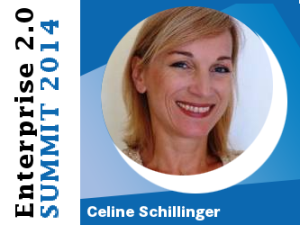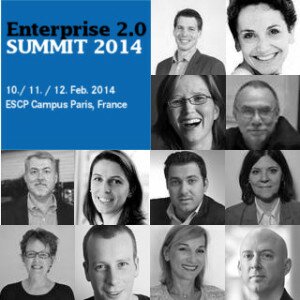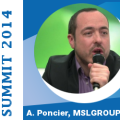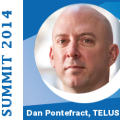After all the methodologies, the theories, the software platforms, the digital age, the articles written and conferences organised, there is one thing, one element, only one, that makes the actual change.
You may have heard refer to them as disruptors, anarchists or corporate rebels, or “that annoying person who doesn’t want to use e-mail”. It’s time to bring them out into the open, to give credit where credit’s due, we call them Change Agents.
This rare breed of employee challenges the status quo by changing the way they work, the way they communicate and the way others perceive work and doing business. And all for the betterment of living. For if we are happy at work, we’ve tackled one of the greatest social issues of the modern human.
 Céline Schillinger is one of those few who change a business from within. She noticed something was not quite right at the company she works for, felt strongly about it and took the leap of action. This invariably led to her being chosen Woman of The Year in France by La Tribune.
Céline Schillinger is one of those few who change a business from within. She noticed something was not quite right at the company she works for, felt strongly about it and took the leap of action. This invariably led to her being chosen Woman of The Year in France by La Tribune.
I asked Céline about her take on the term “Fearless Change Agent” and her responses were quiet astonishing.
Fearless Change Agents are not without fear!
For outsiders, they (the change agents) may only seem fearless, because they take steps most of us would not even consider taking. But, every step they take is riddled with uncertainty and, yes, fear.
For one simple reason, you do not know the outcome of any given step. You try to minimise risk, but you can only hope for a positive reaction, but that’s not always the case.
Change Agents need to deal with these uncertainties, just like everybody else. Support can be found with like minded colleagues or, in Céline’s case, family. Connecting (and uniting) with other Change Agents can give a tremendous boost in confidence, you’re not alone.
The good thing about this, like with most fears, is that you don’t take unnecessary risks and consider each step carefully.
Change Agents need to change too
Becoming an Agent for Change is not a career choice. Chances are you do not wake up one day, find a job (or go to work) with the idea to stir up trouble and disrupt every thing around you. It takes time to fall into that role.
Granted, a certain disposition is needed, Céline travelled to Vietnam at 23, “My parents, my education: they gave me a taste for freedom and enough self-confidence to dare, which is a fantastic asset. But I haven’t always been a change agent. In the first part of my career, I don’t recall stirring things up.”
She goes on explaining that need to change grows gradually. In her case she noticed issues that “touched on my core values”. Meaning she didn’t go out of her way to look for trouble, or change. She stumbled upon an issue which demanded attention and action.
The difference between Céline and a lot of other people is the part where she took action. Because without action, no decision is ever really a decision, it’s just a thought.
Change Agents are not “Crazy Mavericks”
Because of their very nature, Change Agents stand out from the rest. Change is something most people choose to go without. They don’t like it. Meaning, anybody who takes initiative, delivers results or is simply innovative is (or can be) quickly considered a maverick, a rebel, a disturbance.
However, “the reality is that discipline remains highly valued”. Céline explains further (and does it better than I can); “As a Change Agent you sometimes have to go a little bit beyond what’s expected. It’s the very nature of change. Not all changes can be anticipated, managed and controlled by corporate leadership, rules and compliance departments. Disruption is the new normal. By questioning existing ideas, by opening new fields for action, Change agents actually help organizations survive and adapt to the 21st Century.”
And, indeed, the vision of Corporate Rebels United describes this very well:
We love our organizations and want them to succeed. We want to reboot our corporate and organizational culture to install a 21st century, digitally native version, to accelerate positive viral change from deep within the fabric of our organizations, and to reclaim our passion for work.
Change the World and Oneself
Finally, Change Agents have to become the embodiment of change. This comes back to action. This means practising what they preach and leading by example.., how else will you convince anybody else to change and/or take action.Céline took this very seriously and reinvented herself the past year; “I’ve been so lucky to meet people who’ve inspired me, who’ve motivated me to learn, experiment, and grow. They’ve broadened my horizons and made me become a better, more capable person. I came across a significant number of them in the 2013 #e20s, that’s why I was keen on coming back.”
She started a blog at http://weneedsocial.com/. A wonderful move to push yourself, learn new things and share the knowledge, Céline; “This is sooo demanding, and at the same time extremely exciting! I’m learning a lot here.”
She joined Change Agents Worldwide. This is a think tank with thought leaders and change agents working on their own or in large companies. Their purpose is to change the world of work (modern leadership, new business models in the era of networks). To do that, we follow an organization model that we recommend: no offices, titles, hierarchy, org chart… but a self-motivated collective of people gathering around specific projects. We produce services such as executive training, to train corporate executives into social collaboration, connected work and networked organizations.
And, last but not least, she was rewarded with the Tribune Women’s Award. “This prize encourages me to continue striving to achieve change, through social engagement and collaboration”, Céline says.
Taking action is at the very foundation of change, be that on a personal or on a corporate level. It is something to which we can all relate in one form or another. And despite the fact it scares the heck out of us, it is in our fundamental nature to change. It is what drive us forward, it is what made us who we are today.
And it will shape our tomorrow.
Céline joins Remo Ponti on the second day of the Enterprise 2.0 Summit 2014. The topic of their Practice Panel is: Social as Enabler for Corporate Behavior Change. Don’t miss it.












14 thoughts on “Céline Schillinger: Change Agents are going a little bit beyond what’s expected!”